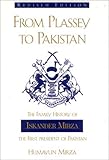Product Description
From Plassey to Pakistan, Revised Edition is an extraordinary study of 300 years of Indian and Pakistani history from the perspective of the Nawab Nazims, the powerful rulers of Bengal, Bihar, and Orissa. The 2002 Revised Edition includes a new chapter on the dramatic change in Pakistan’s foreign policy after September 11, 2001, when its military government joined the US- led coalition to topple the radical Taliban regime it had spawned in Afghanistan. Author Humayun Mirza also discusses a possible confrontation between two nuclear nations, India and Pakistan, over the Kashmir dispute in the continuing war against terrorism.
Buy This book from Amazon Now! Shipping in Pakistan & Round the world available Click From Plassey to Pakistan, Revised Edition: The Family History of Iskander Mirza, the First President of Pakistan to buy now.


Now in a newly revised edition, From Plassey To Pakistan: The Family History Of Iskander Mirza The First President Of Pakistan tells the complex saga that intertwines one family’s story with the inception and development of an Islamic nation. Humayun Mirza is Iskander Mirza’s only surviving son and brings a special and personal expertise to the violence-tainted partition of Indian by the colonial British Empire that resulted in the creation Pakistan. A superb contribution to International Studies reference collections, From Plassey To Pakistan is a vividly informative and very human account which deftly combines extensive research with personal remembrance.
Rating: 5 / 5
As a descendant of the author’s great-grandfather, I had grown up hearing many contradictory accounts of this family’s history. This carefully researched book was very helpful to me in trying to sort out the tangled roots from which my side of the family grew. The author confesses his view is partisan, but nevertheless he does not try to hide the existence of his ancestor’s various affairs in England, his marriage to an English chambermaid (his fourth wife and my great-grandmother), and treats those aspects of the story both objectively and sympathetically. Very readable!
Rating: 4 / 5
Most of what we in the West read and hear about the Indian subcontinent comes from the British perspective. Humayun Mirza, son of Pakistan’s first president and descendant of the royal Nawab Nazims of Bengal, Bihar, and Orissa, brings a thoroughly researched, enlightened, and deeply honest perspective to his family’s story, and by extension the history of India and Pakistan from the 1700s to the present time. Because of his unique insider’s perspective, Mirza makes his historical figures come alive.
Although he is talking about his own family–even his own father–Mirza shows a principled unwillingness to tamper with the truth, even when the truth is not flattering to people he clearly admires. The rich human complexity of these powerful personalities, warts and all, is one of the things that make this book so exciting.
If you’re interested in the history and politics of the region, this is a must read. If you just like to learn interesting history, it’s also a treat. I’m waiting for the update covering the current situation in the region!
Rating: 5 / 5
From Plassey to Pakistan chronicles the lineage of Humuyan Mirza, the author and only son of the first President of Pakistan. The book provides personal and well-researched historical insight into the ruling class of India, of which the author is a direct descendant.
The author’s father, and principal subject of the latter part of the book, is Iskander Mirza, a highly educated and respected citizen of India worked for the British Government of India. Upon the end of British rule in 1947, the country of Pakistan was formed and Iskander Mirza emerged to become a leading public figure (“the strong man”) and eventually the first President of Pakistan.
The author offers excellent insight into his father’s rise to the presidency and the subsequent challenge to bring order and democracy to the newly formed country, one fraught with political corruption at the governmental and military level combined with a high level of illiteracy within the population. Despite Iskander Mirza’s well intentioned efforts, instituting the type of democratic government he envisioned would prove too difficult in this environment. His presidency was usurped by a military coup in 1958. Military control has presided over Pakistan for many of the subsequent years and remains in power today.
The author goes on to revisit his own life as a descendant of India’s ruling and princely class as the son of the first president of Pakistan. Like his father Isakander, the author was educated at prestigious schools while growing up, ultimately attending the Harvard School of Business and subsequently working in various capacities for the World Bank. The author currently lives in the United States.
Toward the end of the book, the author offers thoughtful suggestions that address Pakistan’s current political and economic situation. Above all, the author believes a very strong leader of Pakistan is crucial to help unite the country and its divisive factions. He truly desires prosperity for Pakistan.
The book is insightful and well written. I highly recommend the book for histroy readers and those interested in current events. Given the recent tumultuous events taking place in and around Pakistan, this book is even more relevant.
Rating: 5 / 5